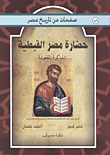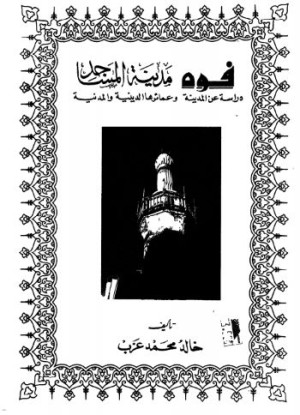حضارة مصر القبطية
(0)
بقلم: أحمد عثمان
التصنيف: تاريخ وجغرافيا
الناشر: مدبولي
عام: 2011
صفحات من تاريخ مصر كتاب لأحمد عثمان ومنير غبور
مزيد من القراءة
مقالات ذات صلة
العصر القبطي
بقلم: المحرر
بقلم: المحرر
إعادة الاعتبار لحضارة مصر القبطية: الذاكرة المفقودة
بقلم: المحرر
بقلم: المحرر
العصر القبطى المهمش
بقلم: المحرر
بقلم: المحرر
فعاليات

العربية السعيدة في بيت يكن
إبريل 15, 2025
العربية السعيدة، لتوركل هانسن وترجمة سوسن كردوش قس...

الأديب: رؤية ومسيرة ... حوار مع إيلان بابيه عبر زووم
مارس 15, 2025
تمت هذه الحلقة في 15 مارس 2025 ، تستطيع الان مشاهد...

مسافر يبحث عن ماء
فبراير 17, 2025
تقيم نقابة اتحاد كتاب مصرشعبة أدب الرحلات تحت رعاي...

مناقشة رواية النباتية لهان كانج الحاصلة على جائزة نوبل للأدب
نوفمبر 08, 2024
تمت منااقشة رواية النباتية يوم الجمعة 8 نوفمبر 202...





Admin - منذ 5 سنوات
من ارشيف تعليقات القراء 2011
name: Khaled Mohamed
كنت أتصور أن هذا الكتاب يتعلق قبل كل شئ بما أصبح يطلق عليه بقدر غير قليل من الابتذال الوحدة الوطنية، لكنني بقراءته المتأنية تبين لي أنه كتاب يتناول التاريخ بالدرجة الاولى فهو ينازع النظرة الغربية الإمبريالية لتاريخ مصر القديم ، ويؤكد على أوجه الاستمرارية في تاريخنا.
Name:محمد عابد
يطرح هذا الكتاب المهم سؤال مهم، حيرني شخصيا كثيرا، ألا وهو متى انتهت الحضارة الفرعونية؟ وبغض النظر عن قضايا الاقباط والحضارة القبطية .... الخ إلا أنه يخيل لي أن تحديد موعد نهاية الحضارة الفرعونية يعد قضية محورية في تارخنا واندهش لآن مؤرخينا لم يعطوها الاهتمام الكافي، والآن وبعد ما فهمت جيدا موقف هذا الكتاب اتمنى أن أقرأ ردودا من مؤلفين آخرين فالمسألة كما تبدو لي تتعلق بجوهر تراثنا ولا يمكن التساهل بشأنها.
Name: Ali Tal
Egypt's Coptic Civilization, pages from Egypt's history, is written (or edited) by Munir Ghabbour and Ahmed Osman. The main point of this well researched and written literary work seemed to me to be how utterly at odds is the Egyptian Christianity with the grim vision of the Coptic history peddled by the Western intelligentsia. Having always assumed that the Semites (including Copts) Christian period began with the Roman occupation of the Eastern Mediterranean to the Muslim era. It is commonsense to say that the Christians of Egypt must have suffered the same terrible fate of their other coreligionists under the tyrannical rule of the bloody Roman emperors. Despite its many warring sects, the flowering of Christian civilisation in the land east of the Middle Sea was during the Byzantium period. Whence I saw the title "Egypt's Coptic Civilization" I was immediately intrigued and began reading to fill in the gaps in my knowledge of the Coptic culture. Unfortunately instead of supplying the Arab reader with a multi-voiced portrait of the Coptic church, the authors were more interested in defending it against the aspersions of the West. Mr Ghabbour and Mr Osman made the usual mistake assigning the Hellenization of the Eastern Mediterranean to the Greek. When during the period of 1300 years that preceded Islam, first Persian then Greek ideas freely mingled in the Levant. Thus "Hellenism" means the adulteration of the Semitic civilisation by Persian and Greek pressures upon our civilization. In fact, examining the influence of Persia on our culture we find it is the more lasting. Of course, the Western claim that Ptolemaic and Seleucids dynasties were foreign to our land is, of course, false and does not even qualify for an answer: is it not the case that Greece itself is part of the Eastern Mediterranean. Its ambitious ruler, Alexander the Macedonian, sought to expand southward and not northward. It is not Western Europe who has a claim upon the Greeks heritage, but us, the Semitic people. And as for the Coptic civilisation, I am still waiting to know their struggle to keep their identity.
Name: Sara Mortada
By all means this is a controversial book about history. My problem when I read such books, is that I need a reply from other historians. Are all the claims that the two authors put forward correct or not? People like myself are never in a position to give a definitive answer. I always thought that Hellenic culture had nothing to do with the ancient Egyptians but suddenly here you have two Egyptian authors who are claiming that there was no such thing as Hellenic culture but rather that the Macedonian rulers of Egypt adopted ancient Egyptian culture and allowed a number of greek scientists and philosophers to build upon it and produce some of the most important mathematical and scienitific discoveries in history.
Name: محمود رجب
على غلاف هذا الكتاب اسمان لمؤلفان هما الأستاذان منير غبور وأحمد عثمان وقد سررت بداية بهذا التعاون بين مؤلف مسيحي وآخر مسلم لضمان الحيدة والموضوعية وكنت في هذا الصدد أتوقع أن يتحدث الكتاب بمنظور المثنى أو الجماعة لكنني وجدته يتحدث من منظور الفرد لهذا فأنني أطرح هذا التساؤل: أيكون كل من المؤلفين كتب بعض الفصول بمفرده ثم قامت دار النشر بتجميعهما معا؟ أم يكون هذا العمل في حقيقته من إنتاج مؤلف واحد ولكنه استعار اسم صديق له لإعطاء القارئ الإيحاء بالموضوعية؟
Name: Magdy Sidhom
As an Egyptian Copt, I felt pride reading this book and I was surprised to read Jamal Zeid's remarks on it. I do not believe he has read this book , this can't be his comments on this work. Rather,it must have come from a bad experience or meeting with people who gave bad impression to others. It is a real pity. Then again perhaps that is how things are when you are out of the country. You hear events happening at home on the news and you think it is the end of the world.
Name:Rita
I agree with all those who have highlighted the struggle between East and West in the interpretation of history. However it is important to note that this book contains a useful summary of the evolution of Christianity in Egypt and the history of St. Mark’s church. This in itself is useful information for all Egyptians and other arabs. We should never forget that this is a region in which Christians know much more about islam than muslims do about Christianity.
Name: دنيا
أنا اتبسطت جدا من قراية هذا الكتاب لاني استوعبت ولاول مرة حجم الخلاف بين الكنيستين المصرية والغربية وحسيت كده ان الكنيسة الغربية غير مرتاحة لان تكون الكنيسة المصرية هي اول كنائس العالم. وعشان كده حاولت تزور التاريخ عشان تبين ان كنيستنا جت في فترة تاريخية بعد انشاء كنيسة روما. ولذلك اشكر المؤلفين لانهم كشفوا ابعاد المؤامرة الغربية وشكرا.
Name: Jamal Zeid
Through the years, I met, and talked with several Egyptian Copts. I also read what some Copts wrote about Egypt and Egyptians.
What is striking is how bad, and how negative, the Copts view Egypt and Egyptians. As a matter of fact, several years ago, one Copt wrote that the Copts should do to the Egyptian Muslims what the Spanish Inquisitors did to the Muslims in Spain: For those who do not convert to Christianity or those who speak Arabic: Torture/Death or expulsion.
I am amazed that I found no sign of an effort at reconciliation or living as brothers / equal citizens. I do not understand this toxic attitude.